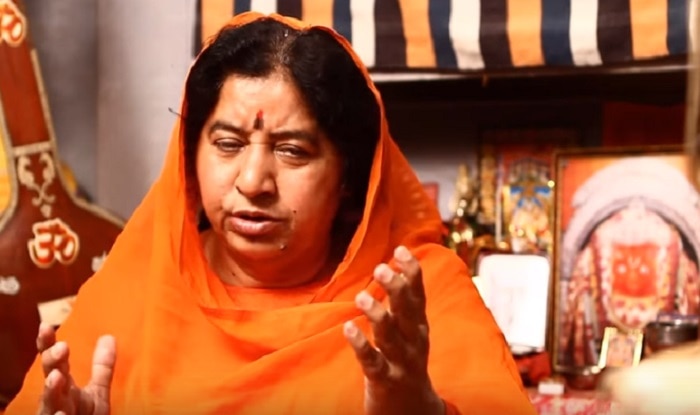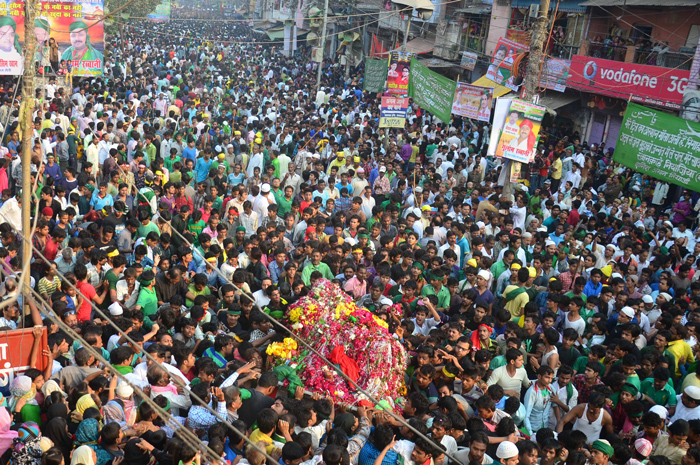dadeechi
BANNED

- Joined
- Sep 12, 2015
- Messages
- 4,281
- Reaction score
- -8
- Country
- Location
Brahmins Fought for Imam Hussain in the Battle of Karbala
After the death of Prophet Muhammad (PBUH), he was succeeded by Abu Bakr, Omar and Usman, as the Caliphs. After the assassination of Usman, Hazrat Ali the son-in-law of Prophet (Also his first cousin) who was married to the Prophet’s daughter, Bibi Fatima Zahira, became the 4th Caliph.
There was stiff opposition to Ali’s rule from Amir Moavia, a known protégé of Usman. He fought with him a bitter war for 5 years and finally got him murdered in a mosque of Koofa, his mausoleum with a golden dome, stands in the nearby town of Najaf (Iraq).
After the extermination of Ali, Moavia grabbed the Caliphate and converted the Islamic state into a kingdom, after his death, his son Yazid became the next ruler. However, the rightful claimants of the Caliphate were the descendants of Hazrat Ali, namely, Hassan and Hussain. While Hassan abdicated his claim to the crown and later died of suspected poisoning, his younger brother Imam Hussain who was till then leading a secluded life in Medina, came out and challenged the usurper, Yazid. It was the war of attrition between the two which led to the bloodshed of Karbala (102 km south of Baghdad), on Oct. 10, 680 AD.
The participation of the Mohyals Brahmins and more precisely that of a Dutt family living in Arabia at that time, in the holy war, is a fact of the history. They are now spread across Sindh in Pakistan, Maharashtra, Rajasthan, Delhi and other parts of India, Pakistan and Arabia. They were a part of the entourage of 200 men and women, including 72 members of Hussain’s family (40 on foot and 32 on horseback), when he left Medina and made an arduous trek to Karbala, where he had a large friendly following. After 18 days, i.e. on the 2nd day of Muhurram, the Hussain’s caravan reached Karbala, on the bank of river Euphrates and surrounded by a hostile desert. On the 7th day of Muharram, all hell broke out when 30,000 strong army sent by Yazid from Mecca and other places, attacked them.
6,000 soldiers guarded the river bank to ensure that not a drop of water reached the Hussain’s thirsty innocents. By sunset of 10th (Ashoor), a Friday, all were dead including his step brother Abbas (32), his son Ali Akbar (22), daughter Skeena (4) and 6 months old infant Ali Asghar who was killed by an arrow while perched in his lap. Imam
On 10th of Muharram, Imam Hussain himself was slain with thirty three strokes of lances and swords by Shimr, the hatchet man of ignominious Yazid. The ruffians of Yazid, as they ran carrying the smitten head of Hussain to the castle of Koofa, were chased by Rahab Datt. He retrieved the holy man’s head, washed it reverentially and then carried it to Damascus. According to legend, he was overtaken by Yazid’s men during his overnight shelter on the way.
They demanded Hussains head from him: Rahab executed the head of one of his sons and offered to them. They shouted that it was not the Hussain’s head, then he beheaded his second son and they again yelled that it was not his. In this way Rahab Datt executed the heads of his seven sons but did not part with the head of Imam Hussain. Later, after one year, it was buried in Karbala along with rest of his body.
The intrepid Datts rallied round Amir Mukhtar, the chief of the partisans of Imam Hussain, fought with extraordinary heroism and captured and razed the fort of Koofa, seat of Yazids governor, Obaidullah, the Butcher. After scoring a resounding victory on the battlefield, they beat the drums and yelled out that they had avenged the innocent blood of Hussain shed at Karbala.
It is also significant to note that even before the Karbala incident, Hazrat Ali had entrusted the public exchequer to the regiment of the valiant Datts, at the time of the Battle of Camels fought near Basra.
The above provides impeccable evidence about tha pragmatic role played by the Datt Mohyals in the catastrophe of Karbala. There are more than a dozen ballads composed centuries ago which vividly and with great passion describe the scenario of the historic event.
Interestingly, in the Preface of his famous historical novel, titled Karbala, published in 1924 from Lucknow, Munshi Prem Chand has stated that the Hindus who fought and sacrificed their lives in the holy war of Karbala, are believed to be the descendants of Ashvathama.This clearly establishes their link with the Datts who consider Ashvathama as an ancestor of their clan.
An ancestor of Rahab named Sidh Viyog Datt assumed the title of Sultan and made Arabia (old name Iraq) his home. He was a tough and tenacious fighter. He was also known as Mir Sidhani. He was a worshipper of Brahma. He was the son of the stalwart Sidh Jhoja (Vaj) who was a savant and saint and lived in Arabia (Iraq) around 600 AD.
The supporters of Hassan and Hussain honoured the Datts with the name of Hussaini Brahmin and treated them with great reverence in grateful recognition of the supreme sacrifices made by them in the war of Karbala. According to Jang Nama, written by Ahmed Punjabi, pages 175-176, it was ordained on the Shias to recite the name of Rahab in their daily prayer. At the time to the Karbala, fourteen hundred Hussaini Brahmins lived in Baghdad alone.
Brahmins Fought for Imam Hussain in the Battle of Karbala | Only Kashmir - Behind the News
After the death of Prophet Muhammad (PBUH), he was succeeded by Abu Bakr, Omar and Usman, as the Caliphs. After the assassination of Usman, Hazrat Ali the son-in-law of Prophet (Also his first cousin) who was married to the Prophet’s daughter, Bibi Fatima Zahira, became the 4th Caliph.
There was stiff opposition to Ali’s rule from Amir Moavia, a known protégé of Usman. He fought with him a bitter war for 5 years and finally got him murdered in a mosque of Koofa, his mausoleum with a golden dome, stands in the nearby town of Najaf (Iraq).
After the extermination of Ali, Moavia grabbed the Caliphate and converted the Islamic state into a kingdom, after his death, his son Yazid became the next ruler. However, the rightful claimants of the Caliphate were the descendants of Hazrat Ali, namely, Hassan and Hussain. While Hassan abdicated his claim to the crown and later died of suspected poisoning, his younger brother Imam Hussain who was till then leading a secluded life in Medina, came out and challenged the usurper, Yazid. It was the war of attrition between the two which led to the bloodshed of Karbala (102 km south of Baghdad), on Oct. 10, 680 AD.
The participation of the Mohyals Brahmins and more precisely that of a Dutt family living in Arabia at that time, in the holy war, is a fact of the history. They are now spread across Sindh in Pakistan, Maharashtra, Rajasthan, Delhi and other parts of India, Pakistan and Arabia. They were a part of the entourage of 200 men and women, including 72 members of Hussain’s family (40 on foot and 32 on horseback), when he left Medina and made an arduous trek to Karbala, where he had a large friendly following. After 18 days, i.e. on the 2nd day of Muhurram, the Hussain’s caravan reached Karbala, on the bank of river Euphrates and surrounded by a hostile desert. On the 7th day of Muharram, all hell broke out when 30,000 strong army sent by Yazid from Mecca and other places, attacked them.
6,000 soldiers guarded the river bank to ensure that not a drop of water reached the Hussain’s thirsty innocents. By sunset of 10th (Ashoor), a Friday, all were dead including his step brother Abbas (32), his son Ali Akbar (22), daughter Skeena (4) and 6 months old infant Ali Asghar who was killed by an arrow while perched in his lap. Imam
On 10th of Muharram, Imam Hussain himself was slain with thirty three strokes of lances and swords by Shimr, the hatchet man of ignominious Yazid. The ruffians of Yazid, as they ran carrying the smitten head of Hussain to the castle of Koofa, were chased by Rahab Datt. He retrieved the holy man’s head, washed it reverentially and then carried it to Damascus. According to legend, he was overtaken by Yazid’s men during his overnight shelter on the way.
They demanded Hussains head from him: Rahab executed the head of one of his sons and offered to them. They shouted that it was not the Hussain’s head, then he beheaded his second son and they again yelled that it was not his. In this way Rahab Datt executed the heads of his seven sons but did not part with the head of Imam Hussain. Later, after one year, it was buried in Karbala along with rest of his body.
The intrepid Datts rallied round Amir Mukhtar, the chief of the partisans of Imam Hussain, fought with extraordinary heroism and captured and razed the fort of Koofa, seat of Yazids governor, Obaidullah, the Butcher. After scoring a resounding victory on the battlefield, they beat the drums and yelled out that they had avenged the innocent blood of Hussain shed at Karbala.
It is also significant to note that even before the Karbala incident, Hazrat Ali had entrusted the public exchequer to the regiment of the valiant Datts, at the time of the Battle of Camels fought near Basra.
The above provides impeccable evidence about tha pragmatic role played by the Datt Mohyals in the catastrophe of Karbala. There are more than a dozen ballads composed centuries ago which vividly and with great passion describe the scenario of the historic event.
Interestingly, in the Preface of his famous historical novel, titled Karbala, published in 1924 from Lucknow, Munshi Prem Chand has stated that the Hindus who fought and sacrificed their lives in the holy war of Karbala, are believed to be the descendants of Ashvathama.This clearly establishes their link with the Datts who consider Ashvathama as an ancestor of their clan.
An ancestor of Rahab named Sidh Viyog Datt assumed the title of Sultan and made Arabia (old name Iraq) his home. He was a tough and tenacious fighter. He was also known as Mir Sidhani. He was a worshipper of Brahma. He was the son of the stalwart Sidh Jhoja (Vaj) who was a savant and saint and lived in Arabia (Iraq) around 600 AD.
The supporters of Hassan and Hussain honoured the Datts with the name of Hussaini Brahmin and treated them with great reverence in grateful recognition of the supreme sacrifices made by them in the war of Karbala. According to Jang Nama, written by Ahmed Punjabi, pages 175-176, it was ordained on the Shias to recite the name of Rahab in their daily prayer. At the time to the Karbala, fourteen hundred Hussaini Brahmins lived in Baghdad alone.
Brahmins Fought for Imam Hussain in the Battle of Karbala | Only Kashmir - Behind the News











